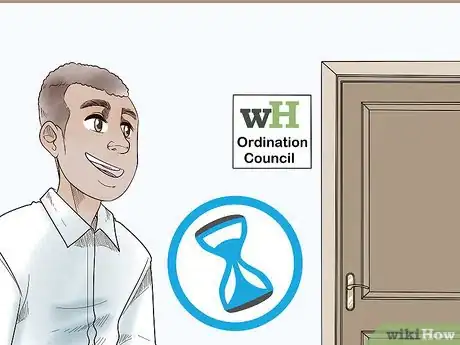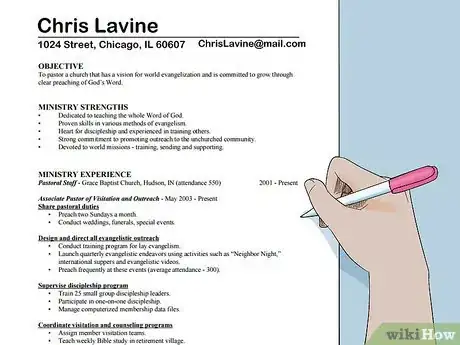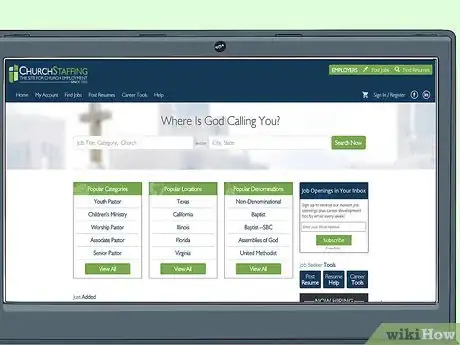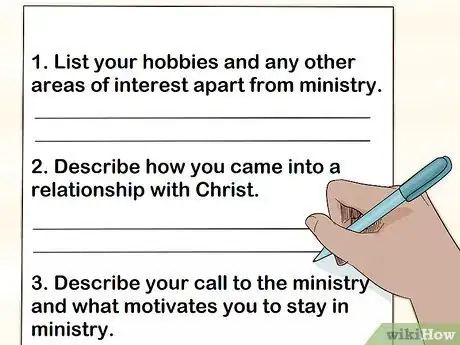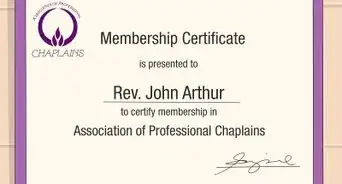This article was co-authored by Zachary Rainey. Rev. Zachary B. Rainey is an ordained minister with over 40 years of ministry and pastoral practice, including over 10 years as a hospice chaplain. He is a graduate of Northpoint Bible College and a member of the General Council of the Assemblies of God.
There are 9 references cited in this article, which can be found at the bottom of the page.
wikiHow marks an article as reader-approved once it receives enough positive feedback. This article received 30 testimonials and 88% of readers who voted found it helpful, earning it our reader-approved status.
This article has been viewed 415,723 times.
Becoming a pastor is a rewarding but challenging journey that will test your relationship with your religion and with God. As a pastor, you’ll lead your church’s congregation, help members with personal and family problems, and perform religious ceremonies, like baptism. To become a pastor, you’ll need to meet the minimum requirements which may include training or even a formal education. After you study and understand the aspects and teachings of your denomination, you must become ordained by your church in order to practice as a pastor. Once you’re ordained, it’s just a matter of applying to a church with a pastor vacancy and getting the job.
Steps
Meeting the Requirements
-
1Become a good standing member in your church. Attend church regularly and help the church with their community initiatives. Be an active volunteer and get to know the leaders and members of the church.[1]
- Becoming friendly with church leaders and staff could improve your chances to become a pastor later on.
- In addition to getting to know church members, regularly practicing the religion and learning the doctrine can help prepare you to become a pastor
-
2Talk to your pastor to see the restrictions for your religion. Certain denominations have restrictions on who can become a pastor. For instance, in certain types of Christianity, only non-divorced straight men can become pastors. Other religions may have looser or more strict restrictions. The pastor of your church will be able to tell you what these restrictions are for your religion.[2]
- Non-denominational churches typically have looser requirements to become a pastor.
EXPERT TIP"The specifics will depend upon the credentialing protocols of the Christian organization to which you belong."
Rev. Zachary B. Rainey is an ordained minister with over 40 years of ministry and pastoral practice, including over 10 years as a hospice chaplain. He is a graduate of Northpoint Bible College and a member of the General Council of the Assemblies of God.
Zachary Rainey
Ordained Minister Zachary Rainey
Zachary Rainey
Ordained MinisterAdvertisement -
3Get a degree in theology to improve your chances of becoming a pastor. Many pastors have a bachelor’s or master’s degree in theology or related field. Find a university or college that offers an accredited theological program and apply to the program.[3]
- While a higher degree in theology isn’t required to become a pastor, it will greatly improve your chances of becoming one.
-
4Get additional training or education in counseling. Sign up to a counseling class or training with a local university or college. Getting trained in counseling will give you the tools that you need to help people with their life problems and will mentally prepare you for some of the scenarios you may find yourself in as a pastor.[4]
- These problems could include things like abuse, addiction, marital problems, and other important life issues.
-
5Have a close connection with your religion. To become a pastor, you’ll need to be completely devoted to your religion. Without an internal desire to spread the religion and help others, you’ll fail as a pastor. The path to becoming a pastor can often be long and arduous, so keep this in mind before you start your journey.[5]
- Consider other job opportunities and make sure that being a pastor is the only thing you want to do.
Becoming Ordained
-
1Study your church’s doctrinal statement. A church’s doctrinal statement will explain the basis of the denomination’s teachings and will flesh out how pastors should teach and how people should practice the religion.[6]
- Knowing your church’s doctrinal statement will give you a better understanding of the relationship between your church, The Bible, and God.
-
2Memorize scripture to backup your statements and beliefs. Before you start preaching and spreading the word of God, you’ll need to be able to backup your sermons and teachings with specific pieces of scripture in the Bible. Read the bible and memorize key passages that relate to what you want to teach.
-
3Speak to your church’s pastor about your interest. Your church’s pastor will be able to answer any questions you have about becoming a pastor. Speak to your pastor after or before mass, and let them know that you want to start training to become a pastor. Talk about your passion for your religion and your desire to help people.[7]
- You can say something like, “I’ve always had a close connection with God and want to help people. I want to become a pastor. Do you think you could help me with this process?”
-
4Attend your ordination council. Once you’re done studying and meeting the requirements to become a pastor, the pastor of your church will invite you to an ordination council. During the council, other pastors and high ranking members of the church will ask you several questions regarding the denomination’s doctrine and about your religion.[8]
- This test can last several hours and is the last step in becoming an ordained pastor.
- If you studied enough, you should be able to answer most questions during the ordination council.
-
5Wait for your verdict from the ordination council. Typically the ordination council will make you wait in another room while they make their decision. If you answered the questions to their satisfaction, they will finish ordaining you as a pastor.[9]
Getting a Job as a Pastor
-
1Write a resume. Your resume should include any church experience or religious education or certificates. If you have a higher degree in theology, it will greatly improve your chances of getting a job.[10]
- If you have limited professional experience in the church, mention your community service or any leadership positions that you’ve had in the past.
-
2Apply to open pastor positions online. Look on online job boards like Indeed, Monster, and Craigslist to see if churches are looking for a pastor. You can also apply to jobs on church-specific job searching websites like ChurchStaffing. Submit your resume and write a cover letter and wait for a response from the church.[11]
- Apply to more than 1 church to improve your chances of getting a job.
-
3Fill out the questionnaire that the church sends you. Instead of an interview, most churches will send out a questionnaire with important faith-based questions on it. These questions could ask you to describe your relationship with God, what you’ve done for the church, as well as questions about your family life and past leadership roles. Fill out the form to the best of your ability and send it back to the church that you applied to.
- Specific questions could include things like “What role does evangelism play in your life?” “How are you strengthening your relationship with the Lord?” and “How do you plan on developing new areas of ministry?”[12]
-
4Perform a practice sermon on the pulpit. Most churches will require that you do a practice sermon to see your skills before offering you the job. Write and rehearse your sermon beforehand. Make sure to link specific passages in scripture to the lesson or story that you’re telling. Evaluate your practice sermon and identify areas that you could improve.
- Many pastors are the leaders of their church, so it’s important to have a powerful and moving sermon that gets church members excited.
-
5Wait for the church’s final decision on whether to hire you. After you do your practice sermon the church will contact you on whether you’re a good fit for their church. If you gave a moving and powerful sermon and answered the church's questions to their satisfaction, there's a greater chance of getting hired.
Expert Q&A
-
QuestionWhat qualifies you to be a pastor?
 Zachary RaineyRev. Zachary B. Rainey is an ordained minister with over 40 years of ministry and pastoral practice, including over 10 years as a hospice chaplain. He is a graduate of Northpoint Bible College and a member of the General Council of the Assemblies of God.
Zachary RaineyRev. Zachary B. Rainey is an ordained minister with over 40 years of ministry and pastoral practice, including over 10 years as a hospice chaplain. He is a graduate of Northpoint Bible College and a member of the General Council of the Assemblies of God.
Ordained Minister A pastor should be a faithful follower of Jesus Christ, a Spirit-empowered student of the Bible, one who knows and meets the Scriptural qualifications for an overseer and shepherd, one who affirms the gifts and callings of the office of a pastor, a person of prayer, a respected person with a respectful heart toward all people.
A pastor should be a faithful follower of Jesus Christ, a Spirit-empowered student of the Bible, one who knows and meets the Scriptural qualifications for an overseer and shepherd, one who affirms the gifts and callings of the office of a pastor, a person of prayer, a respected person with a respectful heart toward all people. -
QuestionIs 13 years too young to start studying to be a pastor?
 Community AnswerNo. You need to do a lot of praying, speaking in front of people (ask if you can do the weekly announcements at your church), reading and writing. Read the whole Bible, get a Bible dictionary, read Bible commentaries, and get good grades in school. Every subject you learn in school can be used in a sermon.
Community AnswerNo. You need to do a lot of praying, speaking in front of people (ask if you can do the weekly announcements at your church), reading and writing. Read the whole Bible, get a Bible dictionary, read Bible commentaries, and get good grades in school. Every subject you learn in school can be used in a sermon. -
QuestionHow will I know if being a pastor is my calling?
 Community AnswerRead the word of God and pray about it. If God is calling you in that direction, every scripture you read will relate back to it and you will not be able to get your mind off of it. God confirms his calling for your life in many ways, but you need to be in a strong relationship with him in order to know if it is truly him.
Community AnswerRead the word of God and pray about it. If God is calling you in that direction, every scripture you read will relate back to it and you will not be able to get your mind off of it. God confirms his calling for your life in many ways, but you need to be in a strong relationship with him in order to know if it is truly him.
References
- ↑ https://www.howtobecome.com/how-to-become-a-pastor
- ↑ https://www.howtobecome.com/how-to-become-a-pastor
- ↑ http://www.patheos.com/blogs/christiancrier/2014/07/14/how-to-become-a-pastor-7-important-steps/
- ↑ https://docs.google.com/document/d/1LC294lqjt24Uex1AcXQzIT6poOideYgzwe6X8BS9cWo/edit
- ↑ http://www.acts29.com/biblical-qualifications-of-a-pastor/
- ↑ https://www.biola.edu/about/doctrinal-statement
- ↑ http://www.my-pastor.com/become-a-pastor.html
- ↑ http://www.my-pastor.com/become-a-pastor.html
- ↑ http://www.my-pastor.com/become-a-pastor.html
About This Article
If you want to become a pastor, attend your church regularly and actively volunteer your time to get to know its leading members. Furthermore, you'll need to be very close to your religion and committed to following its teachings. You may also want to speak to your pastor to ask about any requirements for pastors in your religion. Additionally, read the Bible carefully so you can memorize parts of scripture to back up the things you want to teach. To improve your chances of being ordained, get a bachelor's degree in theology. For tips on how to prepare for your ordination council and how to get a job as a pastor, keep reading!









